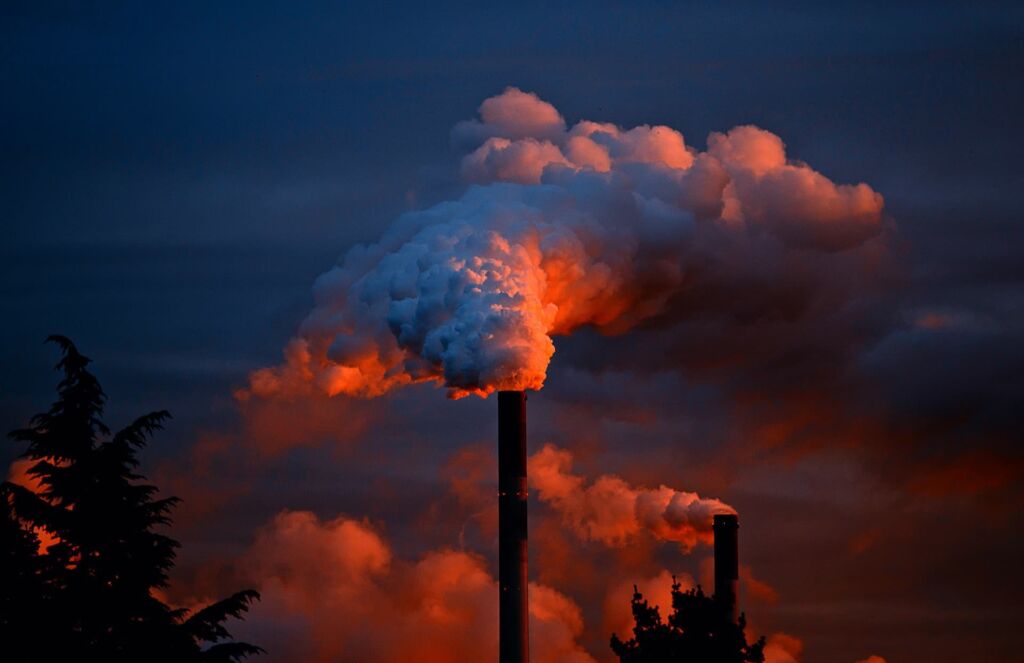The following is a re-print of the March 2023 edition of Shift Storm, the CCPA's monthly newsletter which focuses on the intersection of work and climate change. Click here to subscribe to Shift Storm and get the latest updates straight to your inbox.
The latest national emissions numbers are in and they tell a complicated story of climate progress and pitfalls.
Canada’s emissions were up in 2021 after a pandemic-related drop in 2020, but they were still notably lower than in 2019. That’s a positive sign overall and points to the success of certain climate policies. The phase-out of coal power, in particular, has single-handedly kept Canada’s climate credibility on life support.
On the other hand, emissions from the fossil fuel industry and transportation sector remain stubbornly high. Oil and gas production now accounts for 28 per cent of all emissions in the country—and that’s just getting the stuff out of the ground! Andrew Leach captures the problem well in his annual chart series.
The new Sustainable Jobs Plan and the latest federal budget both put a big emphasis on building out the green economy. That’s necessary for ensuring good jobs and economic prosperity in the long-term, but it’s insufficient for addressing the climate crisis. Without serious policies to tackle fossil fuel production, our emissions targets remain well out of reach.
Canada’s failure to reduce carbon emissions is especially damning in light of the government’s updated estimates of the social cost of carbon, which were also released this month. Every tonne of greenhouse gas emissions costs the Canadian economy around $250 when the consequences for health, agriculture, natural disasters and other factors are considered. That’s five times higher than the previous estimate, which also illustrates the compounding nature of the climate crisis. The longer we wait to cut emissions, the more costly they become.
For the workers and communities trying to come to grips with climate policy, however, those economy-wide justifications for tackling fossil fuels may come as little consolation if their livelihoods are at stake. That’s why we need a just transition, after all, and in this month’s newsletter we learn how just transitions are taking shape in jurisdictions around the world.
Storm surge: this month’s key publications
BC coalition proposes ambitious just transition strategy
A coalition of BC-based groups—the Union of BC Indian Chiefs, Poverty Reduction Coalition, Worker's Solidarity Network, Climate Emergency Unit and the Wilderness Committee—released a A Just Transition in BC, which calls for a wide-ranging provincial just transition strategy. It includes two dozen high-level asks in four main areas: overarching policy framework, support for resource workers and remote communities, Indigenous rights, and adaptation for vulnerable communities.
Though light on details, the plan effectively captures the scope of BC’s transition challenge and prioritizes the right kinds of interventions. Getting workers and vulnerable communities to the table is a vital first step, and investing aggressively in regional economic diversification can both sustain those communities and win political support for necessary climate policies.
The accompanying backgrounder makes reference to the CCPA’s Roadmap to a Canadian Just Transition Act report, which argued for a national-level just transition strategy back in 2021. The BC groups have taken many of those ideas and tailored them thoughtfully to the provincial context. It would be fantastic to see coalitions in other provinces do the same.
Canadian communities don’t have to wait for the state to lead on climate action
And while we’re out west, the CCPA and University of British Columbia co-published Don’t Wait for the State, which makes the case for grassroots climate organizing in communities that feel left behind by government inaction on climate change.
The report draws on a series of international and domestic case studies to lay out twelve principles for effective climate organizing—including starting early, promoting local knowledge, envisioning a better future, and moving from dialogue to action—before concluding with an organizing framework for Canadian communities. The proposed “5D” approach involves defining the community that is undergoing transition, designing inclusive and iterative processes for organizing the community, dreaming up a better future together, determining the constraints holding back effective action, and finally delivering real alternatives for members of the community.
I had the privilege of working on this paper with UBC’s Max Cohen, Isabella Pojuner and Avi Lewis, and we hope it proves useful for communities who are frustrated by the lack of climate action they’re seeing. Grassroots organizing is no silver bullet, and ultimately there is no substitute for the collective power of governments, but, as I argue in an accompanying op-ed, citizen movements can play an important role in building community solidarity, kickstarting local action and shaping broader policy responses.
International unions put pressure on global financial institutions to advance a just transition
Global Unions, a coalition of international worker groups, was invited to make a statement to the joint spring meetings of the International Monetary Fund and World Bank… and they didn’t waste the opportunity. The unions’ declaration, later published as A new social contract for sustainable recovery, makes a series of bold and ambitious recommendations that would reorient the international financial system around workers and the planet.
Among the most radical—but sensible—positions taken by the unions is an “unprecedented expansion of public investment to create decent work [and] enable equitable growth.” The unions make the case, as the CCPA has here, that public spending and public ownership can better support social needs, job creation and environmental priorities than the market can on its own. They also make clear that private investment should not crowd out the public sector or “dilute the voices of the people it is meant to serve.” That’s the opposite of the conclusion reached by the World Bank in a recent report that the “majority of the financing needs of [developing countries undergoing transition] must come from private sources.”
The Global Unions statement also emphasises the importance of a just transition in the context of the global energy transition. If new green jobs fail to protect the rights, wellbeing and economic security of workers, they argue, it will not only lead to worse social outcomes but also endanger the political legitimacy of the climate transition—a phenomenon we are all too familiar with in Canada.
In sum, the Global Unions statement is a vital intervention by the international labour movement on a unique and important stage. It should encourage trade unions at all levels not to shy away from a radical vision for a better world.
United Nations beats the drum for equitable and sustainable development
In the wake of the IPCC’s 6th Synthesis Report, which sounded alarm bells (once again) on the unfolding climate crisis, the past month has seen a variety of United Nations bodies push for wide-ranging, urgent and people-focused climate action.
First, the UN General Assembly passed a historic climate justice resolution that calls on the International Court of Justice to clarify states’ obligations to address climate change. A ruling by the ICJ would not be binding on countries, but, like the Paris Agreement, it would establish an additional legal and political framework to push countries toward more aggressive action.
Second, the UN’s Inter-agency Task Force on Financing for Development released Financing Sustainable Transformations, which shines a light on the growing gap between rich and poor countries when it comes to climate action. It’s not that poorer countries don’t want to mitigate and adapt to climate change—they desperately want and need to—but that they lack the capacity to do so. The report calls for a big boost in international development financing but also a renewed focus on green industrial policies that would give developing countries more control over their own clean economies.
Third, the UN’s Katowice Committee on Impacts released a study, Implementation of just transition and economic diversification strategies, that compiles best practices on economic diversification and a just transition of the workforce. The research is grounded in 15 wide-ranging case studies—including several I wasn’t previously familiar with, such as France and Rwanda. The biggest takeaway: you can’t achieve inclusive policy outcomes without the genuine participation of stakeholders.
Finally, in the lead-up to its 2024 Summit of the Future, the UN has published a policy brief, Meaningful Youth Engagement in Policy and Decision-making Processes, decrying the absence of youth voices in decision-making at all levels. While the recommendations are largely focused on the UN itself, the brief includes a general call for member states to create more robust systems for youth participation. That’s especially important in the climate context, which is a deeply intergenerational problem, as I’ve argued before.
Research radar: the latest developments in work and climate
Appalachian communities making just transition a reality. The Reclaiming Appalachia Coalition released its annual report, National to Neighborhoods, which includes a set of concrete and hopeful examples of what a just transition can look like at the local level. These aren’t grand infrastructure projects or sweeping training programs; instead, we learn about how coal communities in the U.S. states of Ohio, Virginia and West Virginia are scaling up smaller-scale clean industries, such as outdoor recreation, while investing in workers through new local training centres. Grassroots projects like these are the building blocks of successful regional and national transitions.
Decarbonization reproduces underlying inequalities in the absence of progressive interventions. New research published in Nature Communications finds that the process of cleaning up Europe’s electricity grid is likely to make affluent regions better off while punishing the regions with the least capacity to adapt. That’s one of the fundamental arguments for a just transition, so the findings may come as little surprise to readers of this newsletter. But the quantitative case offered in this paper is still helpful to have in the back pocket. While the authors do not make specific policy recommendations, they note that targeting clean electricity investment in former fossil fuel regions can help mitigate the downsides.
Indian coal region considers comprehensive just transition approach. A report copublished by the consultancies Climate Trends and EY, Livelihood opportunities for a Just Transition in Jharkhand, offers a deep dive into India’s most coal-dependent region, Jharkhand, which is home to 300,000 coal workers. While the livelihoods of these workers are threatened by some climate policies, they also stand to benefit from greener jobs that offer greater economic security and fewer health risks. Achieving those positive outcomes for workers will require coordination between every level of government, the private sector and workers themselves, the report notes, and the first step is establishing a clearer timeline for India’s coal phase-out.
UK’s latest climate plan clings desperately to fossil fuels. The UK released Powering Up Britain, its second climate plan in as many years after the UK’s High Court found the previous version insufficient for meeting the country’s legislated emissions targets. While this new plan is marginally better, it relies extensively on carbon capture technologies at great public expense. While the plan talks a lot about jobs, it emphasises the protection of existing oil and gas jobs and touts the creation of tens of thousands of new jobs in the CCUS industry. Critics, such as the London-based Environmental Justice Foundation, called the plan a “love letter to the fossil fuel industry.”
South Africa’s just transition plan missing the mark for many workers. A fascinating story from the Oxpeckers Center for Investigative Environmental Journalism captures the anxiety around just transition in South Africa. While the country has approved a US$8.5 billion transition plan, many of the workers and communities who are supposed to benefit from it feel left out. It’s a lesson in poor government communications, certainly, but also of the limits of policy-making without sufficient social dialogue.
Webinar: what comes next for just transition? On Monday, May 1st, the School of Global Environmental Sustainability at Colorado State University is hosting a webinar to discuss what the just transition concept can and should mean moving forward. You can register here.
New book explores power, inequality and injustice through a history of just transitions. Last but not least, a new book by Dimitris Stevis, Just Transitions: Promise and Contestation, looks like a must-read for followers of this file. I only found out about it today and will do a deeper dive in the next newsletter, but I wanted to include it here because you can read the book for free until May 10th. Don’t miss it!
That’s it for this month! If you found this newsletter helpful, tell a friend or a colleague to subscribe. And if you think we missed something or have any other feedback, please get in touch with your suggestions.
Until next time…







